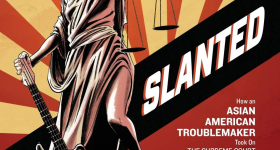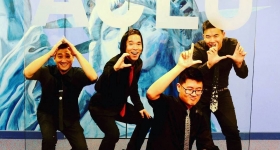Next month marks five years since the inception of Asian Americans for Civil Rights and Equality (AACRE), which is a network comprised of 11 organizations fighting for justice through an intersectional lens. AACRE works with Asian, South Asian, Southeast Asian and Pacific Islander refugees, immigrants, LGBTQ, incarcerated folks, artists, faith leaders, survivors and more! AACRE’s work has allowed them to reimagine a vision of liberation that is inclusive and intersectional. The five-year anniversary celebration is a momentous occasion, and AACRE will be celebrating their work with a Party for Justice on June 7 at 9:00 pm in San Francisco at the Westin St. Francis on Union Square.
The Party for Justice will feature many amazing Asian artists and performers.
Ruby Ibarra, Bay Area rapper and spoken word artist, is among the headliners. Hyphen had the chance to sit down and speak with her about her work and her journey to discovering who she is as a Filipina artist.
Can you talk to us about what it was like to grow up in the San Francisco Bay Area? Do you remember much of your younger years in the Philippines?
I don’t have many memories of living in the Philippines since my family and I moved to the United States at a very young age. But the earliest memories I can remember do include my family’s migration and settling into the Bay Area and getting familiar with the new culture, the new language and the new community that we ended up living in.
Oftentimes people move and face a lot of cultural and language barriers, but I was lucky to have my family support through it all. I immediately started school within months of our arrival in California and for the first time I was introduced to such a wide array of cultures and backgrounds.
I came from a small town in the Philippines, so I grew up with people I was already familiar with. Moving to California, for the first time, I was immersed in a community that was so full and so vibrant with so many different languages and cultures and food. I can’t imagine having moved somewhere other than the Bay Area. That location made the transition from the Philippines that much easier because the community we moved to had so many diverse backgrounds and cultures and ethnicities.
We moved to Hayward initially and I was 4. I didn’t speak much English at the time, but I had already been introduced to English through television shows and music that my family loved. I just wasn’t communicating fluently in English at the time.
How do you feel the Bay Area shaped you in becoming the artist you are today?
I definitely think that the Bay Area is the reason why I am the artist that I am today. When you think about the Bay Area, you immediately think of artists like Tupac and Hieroglyphics. They’re definitely the kind of artists I grew up listening to, so I think the fact that the Bay Area is so rich in hip-hop and its history with a lot of the social justice movements — I think all of that essentially shaped the music and themes I like writing and talking about.
Do you think you would have pursued the path you have if you’d stayed in the Philippines?
That’s something I’ve thought about myself and it’s a very valid question. Especially being a first-generation daughter of two immigrants, I constantly think about what my life would have been like if I’d grown up in the Philippines and how vastly different that would have been. To be honest with you, I am not so sure I would have pursued music or been an artist if I had grown up there.
I think being an artist oftentimes comes with a lot of liberties and freedoms, especially when it comes to feeling like you have a platform and the freedom to be able to express yourself, and I know, especially with the Filipino culture, it’s a lot more conservative. Especially for young Pinays, I think that was evident to me when I performed in the Philippines these last two or three trips I’ve taken and I still get people in the audience just completely surprised when they hear me rap so unapologetically. They tell me that they’ve never seen a Pinay do anything like that and it just highlights that fact that a lot of women back home in the Philippines still aren’t given the voice and still don’t have the power. They still don’t feel like they have the power to speak for themselves and that’s what I’m hoping to accomplish. I hope to show other Pinays that we have a story to tell and a voice to share and that we should be unapologetic about it. But I know, regardless, I would have still been in love with hip-hop. The very first artist I listened to was Francis Magalona. And actually, I was introduced to him when I was still in the Philippines.
Why were you interested in performing for the AACRE Benefit? How were you introduced to the event?
Organizers reached out and I had heard of AACRE and really support their mission. I also saw the lineup, which excited me because of the prolific artists and community organizers who were going to be featured. I definitely wanted to be a part of the event. I stand in solidarity with what they’re doing, and I think we need to continue to have events like this and remember that we’re not just using music for entertainment but also as a tool to spread knowledge and talk about our stories and to inspire others.
What are you working on now? I know you released a mixtape, Lost in Translation, in 2012 and that you released a debut album in October 2017, Circa 91. How did it feel to get the endorsement of someone like DJ Kay Slay and also to release your first album?
Lost in Translation, for me, was really kind of my declaration as a hip-hop artist. I wanted that project to reflect the fact that I was an emcee and grew up listening to a lot of Bay Area and West Coast rap but was also influenced and so much in love with a lot of the East Coast rap of the ’90s as well. I often credit artists like Wu Tang Clan and Lauryn Hill as my sole inspiration for the style of rap that I do now. With a project like Lost in Translation, I wanted to make sure I could show people that I could rap. I basically approached each track by taking them on as opportunities to show people the different complexities that come with lyricism. At the time, I was completely interested in trying to showcase those different skills, and I was actually surprised when the opportunity with DJ Kay Slay came to be. He premiered the project live on K45 radio in December of 2012, and I just remember it being a surreal moment. Obviously, DJ Kay Slay is such an iconic figure in hip-hop and he’s done a multitude of things, from jump-starting artists to putting out his own mixed tapes.
For the listeners that followed me from Lost in Translation, I hoped that they saw the personal growth that occurred between those years. Whereas Lost in Translation was more focused on Ruby Ibarra the rapper, I think with Circa 91 I really wanted to show people who I was behind the microphone, where I came from and why I do what I do. Really feature my family’s migration story. A story I felt was necessary given the time of its release when the political and social climate harbored a lot of discussion about migration and I felt like it was very necessary to have those discussions during that time. Also, I wanted to showcase what I think the Filipino American experience is for me. I always felt like our stories were a footnote in every book I read. It wasn’t until I read a book like Elaine Castillo’s America is Not the Heart that I finally saw someone who looked like me and my family tell a story. I wanted to be able to accomplish a project that I hoped would serve the same purpose in the way that America is Not the Heart did for me.
Can you talk about what it’s like to be an Asian, female rapper in a space where female artists are rare? What kind of unique challenges do you feel you face as a woman and as a person of color?
As a woman of color in a still very male-dominated space like hip-hop, I think the challenge is still very much around the visibility. When you think about these large hip-hop music festivals that go on throughout the year, for me, I rarely see women’s names on these lineups and if anything, it’s just one out of 99 other names. There needs to be a conversation around that and more organizers who take action, including more women in these spaces. I think after hearing an album like The Miseducation of Lauryn Hill, it’s evident that we need to hear those perspectives as well. There are so many who can relate to those stories and also need to be represented. As a fan of hip-hop, I’m lucky to be in a time when we have artists like Rocky River and even Magnetic North, who have female voices out there in a male-dominated space and more so, in a time important for Asian American hip-hop artists. Seeing all these AAPI women who are also emceeing, to me, is very important for our culture and very important for us to move progressively through and in our communities.
What’s next?
I typically stay up till 3 am writing notes like a mad scientist, trying to prepare for the next project and constantly working on something. I’m completing my last music videos from the last album. Also looking to start working on my follow-up album. Beat Rock, which is my label, is looking to have my follow-up album by the end of the year and I’m hoping I can make that happen.
To learn more about the Party for Justice and to purchase tickets, go to: https://www.eventbrite.com/e/party-for-justice-aacre-5th-year-anniversar...
To learn more about Ruby Ibarra, go to: https://www.rubyibarra.com/.










Comments